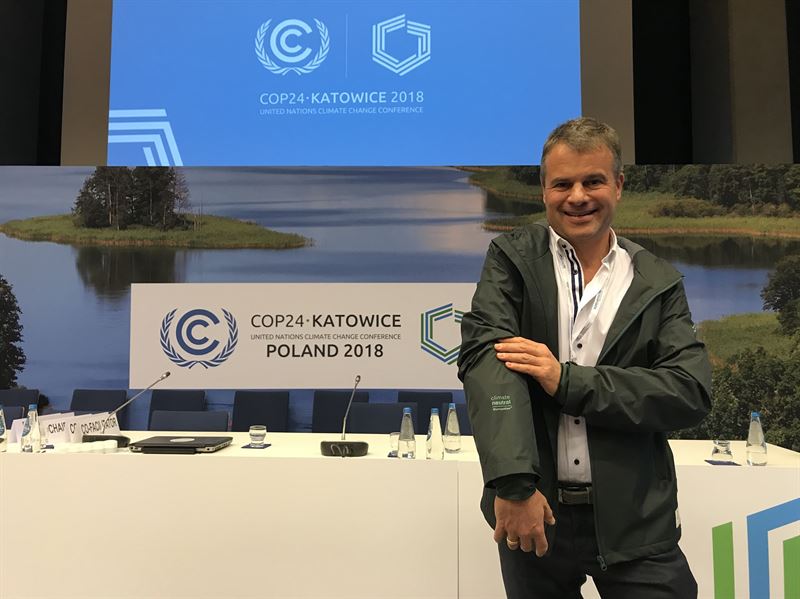Milestone for climate change at COP24: Sympatex Technologies is one of 40 signatories of the United Nations “Fashion Industry Charter for Climate Action”

Leading fashion brands, retailers, suppliers, member organizations and NGOs make joint commitment to follow and implement 16 goals for tackling climate change.
Munich / Katowice, December 11, 2018 – Yesterday, the UN “Fashion Industry Charter for Climate Action” was officially presented to the global public for the first time. The charter represents a milestone for climate change in light of the fact that the textile industry is the world’s second largest polluter – right after the oil industry – and is currently responsible for 8 percent* of the world’s CO2 emissions. Sympatex, a pioneer in the area of sustainable functional textiles, is not only a signatory, but also actively participated in the development of the charter. The stated goal is to continuously reduce harmful greenhouse gases along the entire textile value chain and achieve net zero emissions by 2050. As a first step, the signatories agreed to a 30 percent reduction by 2030. Plans are in place to define specific individual measures and create a working group. Apart from Sympatex, the signatories include Puma SE, adidas, Mammut Sports Group AG, Hugo Boss, H&M Group, Schoeller Textiles AG, Pidigi S.P.A. and fashion designer Stella McCartney, in addition to key NGOs involved in the promotion of sustainability in the textile industry such as the Sustainable Apparel Coalition (SAC), Textile Exchange and ZDHC (Zero Discharge of Hazardous Chemicals).
In addition to the reduction goals, the charter includes individual measures and concrete recommendations for action. These include the selection of climate-friendly materials as early as the design process, monitoring and reporting on the effects of raw materials on the climate, disclosure of the preferred raw materials and respective energy sources, as well as the goal of being able to return the materials to a value-retaining circular economy after they are used.
Data from the SAC HIGG Index clearly shows that the better part of the harmful greenhouse gases cannot be reduced through the often necessary transport of the textiles around the globe, rather through the careful selection of the materials. In the case of functional textiles for instance, merely relying on Sympatex polyester membranes instead of still-popular PTFE membranes can reduce total CO2 emissions by more than 50 percent during the production of a functional jacket. With gloves, the number can even exceed 60 percent and with functional shoes up to 15 percent.
“The charter is obviously open to additional members. Commitments from additional industry participants increase our chances of making a mutual impact in order to reach the goal of driving down global warming to under 2 degrees as outlined in the Paris Climate Accord,” explains Dr. Rüdiger Fox. “Katowice proves that our industry is ready to take significant steps and is willing to make urgently-required changes to the current mindset. More and more brands are beginning to understand that instead of viewing sustainability as a threat, or purely as a responsibility to society and the environment, it offers an economic opportunity for the companies of tomorrow,” says Fox who adds: “Green is the new blue ocean.”
* 27/02/2018 Measuring Fashion, Quantis & Climate Works Foundation
PR Contact:
Sympatex Technologies GmbH
Sonja Zajontz
Feringastraße 7A
85774 Unterföhring
Germany
Mail: sonja.zajontz@sympatex.com
Tel. : +49 (0)89 940058 300
About Sympatex
Guaranteed Green – The Sympatex climate-neutral and recyclable membrane
As one of the worldwide leading producers, Sympatex® Technologies has been a synonym for high-tech functional materials in clothing, footwear, accessories and technical fields of application since 1986. Together with selected partners, Sympatex develops, produces and distributes membranes, laminates and functional textiles as well as finished products worldwide. The Sympatex membrane is highly breathable, 100% wind- and waterproof and regulates the climate. It is 100% recyclable, bluesign® certified, and it received the 'Öko-Tex-Standard 100' certificate. It is also PTFE-free and PFC-free. The technologies and procedures are based on the principles of ecological responsibility and sustainability with a special focus on the optimal carbon footprint. Sympatex is represented worldwide with sales offices and branches. www.sympatex.com
Tags:




